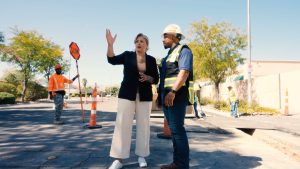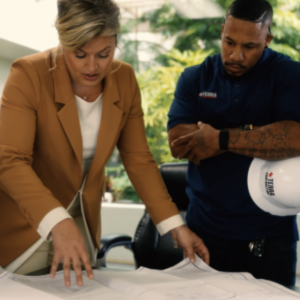
Tera Anderson, mayoral candidate for the city of Las Vegas (Photo: Tera Anderson for Las Vegas)
Meet Tera Anderson, Mayoral Candidate for the City of Las Vegas
Anderson: ‘The Badlands is a reflection of the dangers of electing people who are out of their depth’
By Megan Barth, June 1, 2024 6:32 pm
Meet Tera Anderson, mayoral candidate for the City of Las Vegas and a second-generation Nevadan who is no stranger to working with the city on land development and infrastructure projects. Yet, she is a stranger to running for office in that this is the first time she has appeared around the City of Las Vegas as a candidate.
When asked why she is running, she replied, “Because I love this city. I grew up here. I am a second-generation Nevadan in the City of Las Vegas. I have worked within the city on land development and infrastructure projects and I am the only person in this race who has the experience and expertise to tackle the challenges the city faces and who has the knowledge to do what needs to be done to ensure that the City of Las Vegas thrives. But, more specifically, this race is about producing actual, tangible results beyond aspirational, political talking points.”
Anderson’s confident pitch extended into detailed observations and solutions that stem from her experience of working inside and outside of city government.
To a city facing a $250 million judgement against a $600 million budget, solutions are needed…and expected by the taxpayers who are on the hook.
If you hadn’t heard much about Anderson’s candidacy until now, it might be due to the debate parameters set by some in the media, requiring her to raise $500,000 to be considered for the debate stage, and have a minimum percentage in the polls. Yet, with two of her competitors polling in single digits, and the leading candidate polling at only 16 percent, a majority of voters remain undecided.
Anderson is certainly not undecided on why she should earn the trust and the vote of the residents to elect her as their next mayor.

What is your your background in city government and your educational, professional experience?
I have been in land development, real estate development, economic development for the better part of 20 years in various capacities.
I currently serve as Vice President of a privately-held industrial commercial developer. As a part of my career, I was recruited by the City of Las Vegas and the City of North Las Vegas to help with infrastructure planning and business development, and to try to help make municipal governance, by way of process, more modern and conducive to the modern economy. We have outdated municipal ordinances that suffocate new innovative business and industry. So, it’s important that government procedure, rules, and municipal ordinances evolve in ways that allow cities to court the kind of development, business attraction, and employment opportunities that are relevant to the modern economy.
I never thought I would ever end up in the public sector. But, I can say my work with the cities was the most rewarding time in my career because you’re building cities. And, when you do it intentionally and deliberately, and in ways that are a value-add to the community, you enhance the quality of life people who live there.
That to me is a worthy pursuit, but it also shows how vulnerable the community can be if the elected people making decisions don’t know what they’re doing.
As far as my formal education, I’ve a a bachelor of arts in political science. I have an executive MBA and I’m finishing a Masters in Construction Management.
This is my wheelhouse, but most importantly, the public sector doesn’t oftentimes have very nice things to say about the private sector, and the private sector doesn’t oftentimes have very nice things to say about the government. It is critical to bridge those conversations in ways where you have intact fundamental rules of engagement by public agencies, where you establish transparency and policy, and a navigable rule of engagement so the private sector can still create, innovate and help communities evolve.
The unique thing about me is that I speak both languages.
Taxpayers on hook for massive court losses over Badlands. How will Las Vegas pay? https://t.co/TPoKqgZfbi via @reviewjournal
— Tick Segerblom (@tsegerblom) June 1, 2024
Let’s talk about the elephant in the room, the Badlands. The City of Las Vegas and the taxpayers are on the hook for over $250 million due to a State Supreme Court ruling against the city brought by a residential developer. What are your solutions, and why are you the best person to oversee the business of the City of Las Vegas?
The Badlands is a problem for a variety of reasons. The most obvious being the financial implications to the city.
Right now, the cumulative cost to the city is $250 million before compound interest and legal fees. With every passing day, this number continues to grow.
Secondly, what many people don’t realize is, this isn’t over. There’s still an additional 100 acres of land that is up for further litigation. So, the financial implications are obvious. But, there’s also the opportunity costs–other social issues, beautification issues, community issues, healthcare issues, homeless issues, infrastructure issues, that are displaced and where value-add investments could have been made. So, this cuts both ways.
Thirdly, and the most egregious, is that this is the epitome of the weaponization of taxpayer dollars.
There was no merit for the city to engage in this fight. The city undermined all of the fundamental ground rules of private property rights and land use. When the city chooses to carry the water for private interests that wanted to fight this developer or impede this developer from building, that was was an overreach by the city government.
In an unanimous verdict, the Supreme Court ruled against the City of Las Vegas. If you read the Supreme Court’s summary decision, it is awful as far as how it frames the behavior of the city…and, it’s not just that they claim that the city did not have standing. It’s inverse condemnation. It’s the equivalence of a “taking.” The city interfered in every way possible to prevent the developer from moving forward.
There’s a narrative by one candidate in the race, Cedric Crear, who is claiming he’s protecting the residents. Well, he’s not. There are still legal constraints on the city’s authority and jurisdiction. Yet, Councilman Crear doesn’t seem to understand the Supreme Court’s ruling or the legal constraints.
Crear claims that land use isn’t a right because that could leave the city open to strip clubs being built in neighborhoods. That is fear mongering. And, that is also conflation of the issue. Strip clubs are not a land-use issue. They’re a special-use permit, business licensing issue. Understanding these distinctions are critical when you’re evaluating the tact that the city should take on addressing development applications. After seven years on the council, the distinction between business licensing and land use should be something Councilman Crear understands.
Two of the mayoral candidates, Councilman Crear and Councilwoman Victoria Seaman, are the very people responsible for this mess, yet somehow believe they deserve to be promoted to be the mayor of the City of Las Vegas? In the private sector, when you bankrupt an entity, you don’t get promoted. You get fired.
The other thing that is important and is also neglected, is that this property owner–the developer–is a taxpayer, a resident, a voter, and a constituent. So, to pick winners and losers is not the government’s job. There should be a fundamental set of ground rules that are adhered to so there are win-win outcomes.
What would have been wiser on the part of the city would have been to work with the developer to find a win-win solution for the residents and the developer. It’s residential use adjacent to a residential neighborhood. So, with that, there can be an increase in the setbacks, an increase in the landscape buffers, attempts to preserve the elements that protect privacy, and other elements negotiated to maintain harmony for existing residential properties with the introduction of new residential build.
On public record, I have approached the city several times regarding the Badlands. I implored the city that if they don’t want private development on this land, then buy the land outright in an open, buyer-seller transaction and make it an open space, a park, or whatever makes harmonious sense.
Was the Badlands the primary issue that compelled you to run?
It’s one of several, but, yes, it’s up there. The Badlands is a reflection of the dangers of electing people who are out of their depth, who don’t have a command of the technical details that are important to draw upon when making decisions, and then casting votes on complex issues. The complex issues facing the city cannot be solved if we don’t have the money to solve them.

Is the city going to cut a check for hundreds of millions to the developer, or what are they proposing to do?
I can’t speak to that. There’s rumblings that the city is going to try to appeal or continue to fight, somehow. The problem now for the city and the taxpayers is that the city is not in a position of strength.
To me, the only option is to take the gun out of the developer’s hand and disarm the situation by bringing the developer back to to the city, encouraging them to come back to the city and represent their development plan for approval. This is a part of the public record, so it is transparent. This offer gives the developer the level of confidence they are going to receive good faith, fair dealings from the city.
Then, you have to negotiate.
What is exactly the pound of flesh that they are going to want out of the city? The unfortunate reality is the developer has incurred real costs. I don’t know what those are. I’ve never spoken to them. What are those costs that they need to be made whole on? What is acceptable for them from a negotiation? This is where this starts.
Currently, there is no accountability on these council people. It’s the taxpayer’s money that the developer is entitled to, based on the ruling from the Nevada Supreme Court.
So, the only option is to negotiate. But, until you diffuse the situation by approving the development plan and giving them the assurance that the city is no longer going to stay the course, weaponizing itself by fighting them, there is no other way to reach a settlement agreement.
This is why understanding state government is so important, functionally.
When there is private settlement conference or a negotiation on litigation, you can all arrive to the table, discuss, negotiate, and come to an agreement. You can’t do that privately with public assets.
You can’t induce the city to a decision outside of a public vote. So even if the city says, “Okay, we want to settle with you,” you still have to take that negotiation to public vote.
Until the development plan is approved, there’s no incentive based on the city’s conduct to date for the developers, the owners of that property, to take the city at face value and believe that they’re getting fair, good faith dealings in a settlement negotiation.
It’s not uncommon for developers or substantial property owners to follow local elections. I haven’t spoken with them, but I am sure they know who I am because of my candidacy and my platform on this issue.
I’m not running because I’m carrying the water of the developer. I’m running on principle, because the Badlands is a prime example of exactly how government should not conduct itself.
You need people who have a relevant set of experience and expertise to help extract the city from this problem. I negotiate for a living. I solve these complex land use issues for a living. I read blueprints for a living.
Our existing city council members who are running for mayor have been party to escalating and creating the very problem that the City of Las Vegas taxpayers are facing.
Both of them have had either five or seven years to display their capabilities, and they haven’t done it. They are not equipped to solve the problem.
Victoria Seaman goes on to talk about how she has been interviewed and has stated numerous times on record that she “doesn’t think that this litigation is a valuable use of taxpayer dollars.” That is actually accurate. What she conveniently leaves out is that more than 20 times over five years, she has voted in favor of pursuing the litigation. So where is the strength of conviction to vote according to your what you say is your conscience?
Seaman also espouses to bring bold leadership to the city, but she hasn’t been able to earn the respect of her colleagues on the council in the last five years to effectuate a result in her current capacity. What would lead any member of the community to reasonably believe she will be capable of doing so as mayor?
Now that this ruling has been done, now that they’ve been interviewed multiple times on Channel 8 and with Ralston’s side show called a “debate,” what are they saying their plans are?
They’re not. Neither of them have articulated a specific, tactical plan to extract the city from it.
Crear is saying he would do it again because he is defending the neighbors. He doesn’t even see the wisdom of recognizing that the Nevada Supreme Court has told him he is legally out of bounds.
What does candidate Shelly Berkley say about the Badlands? She is leading in the polls at only 16 percent?
Yes, only 16 percent! Which brings in the media as well. The media does not exist to pick winners and losers, either. One role of the media is to educate the public. The debates featured only three candidates, two of whom are directly responsible for the Badlands. I tried to get on that debate stage, but was told that polling and fundraising were the metrics by which I would be allowed to publicly challenge my opponents and appeal to the voters. Although I entered the race in October, I quickly raised $200,000, not the $500,000 the press required to be worthy of a microphone. Debates and elections should be a competition of ideas, qualifications, and visions, not a competition of wallet size.
This is the problem. This is why voters are undecided. This is why more and more voters feel as though they aren’t being heard by their government. This is a nonpartisan race, in a general election year. This seat is so important for the future of the city, and yet what was important to the media was money in the bank and awful polling averages. The three chosen to be on the stage polled collectively at about 35 percent. So, if over 60 percent of voters are not supporting them, there is a reason for that.
But to answer your main question, Shelley Berkley has said that she doesn’t agree with Councilman Crear’s position. She touts the fact that she has negotiation experience and that she can negotiate with a developer. Well, that is generic. There are no specifics. She, to my knowledge, has not articulated any specifics on how to unwind this.
Editors note: This interview has been shortened for readability. Part Two of the interview to follow and will unwind additional solutions in relation to housing affordability, homelessness, safety and other issues that Andersen covered with The Globe.
- Illegal Alien Identified As Wrong-Way Driver in Fatal Crash That Killed LVMPD Officer - December 23, 2024
- Senator Rosen Joins Letter Raising Concerns About Pete Hegseth’s Nomination - December 20, 2024
- NV SOS Launches Four Investigations Into 2024 Election Violations - December 20, 2024





I am out in Nye county- so not my issue, but don’t they want to “infill” with high end single family homes?? At least they aren’t putting in low income, high density apartments